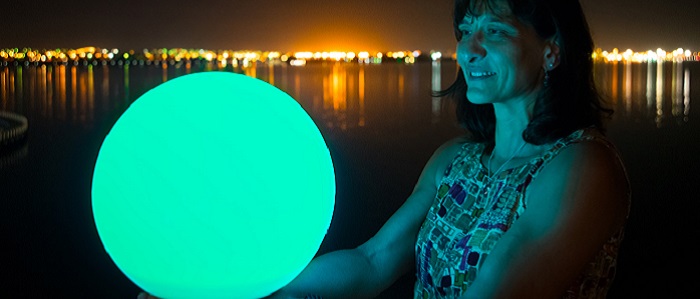News
3D printing bone tissue
Jun 28 2022
ACES Associate Director Professor Maria Forsyth is renowned for her pioneering work towards the next generation of safer and longer-lasting batteries and her passion for clean and renewable energy.

Australian Laureate Fellow and Alfred Deakin Professor Maria Forsyth joined Deakin in August 2010. Internationally renowned for her pioneering work in developing advanced electrolyte materials for electrochemical devices, Maria is Director of the Deakin/CSIRO Battery Technology Research and Innovation Hub (BatTRI-Hub), Deputy Director of the Institute for Frontier Materials (IFM), Associate Director of the ARC Centre of Excellence for Electromaterials Science (ACES) and Chair of the ACES Research Training Group.
‘Seeing success in my team and mentoring both students and other staff is my favourite part of my job. I also love the science that we do.’
What aspect/s of your life and personality does your exhibition portrait reflect?
‘The whole of the moon’ reflects my passion for clean energy powering the world.
Amongst friends and family what are you best known for?
Being passionate and caring about my work, my family and the people around me, and wanting to make a difference.
What’s the biggest change you’ve made and what was its impact on your life and those around you?
Moving to Deakin after nearly 20 years in another position allowed me to grow an amazing team of young researchers, who themselves are now growing teams that look at important societal problems such as sustainability in both energy and infrastructure. At the time it was a big step, as most Australian academics who had permanent jobs stayed put back then (there is slightly more mobility now) and I was leaving a well-known GO8 to come to a lesser-known Deakin. But the risk I took to move was absolutely worth it. The team grew from a handful to over 50 and is now internationally recognised at both the fundamental and translational level in energy and corrosion.
What do you see as the next change in women’s roles in society?
As more women enter higher level roles and the gender balance continues to improve across not only universities, but also government and industry, we should see a change in societal values and, hopefully, the diversity at the top level of governance will start to change the world for the better. Women have a role to play in this. At the moment, everything is driven by power and money but perhaps we will see some decisions being more empathetic and socially driven. How we define success may change as we see a greater balance of gender and diversity in general.
Deakin has recently been recognised as an employer of choice for gender equity. As an employer, how has Deakin helped your career?
Deakin has always been very supportive of my career at all levels.
This article was originally published on the Deakin University website as part of the International Women’s Day 2018, Deakin Women photography exhibition. You can read more about the exhibit and Maria’s image titled ‘The whole of the moon’ here.













